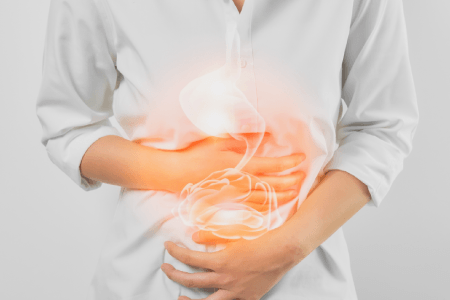Signs And Symptoms

- Early stomach cancer may not cause any symptoms.
- As the cancer grows, symptoms may include:
- Loss of appetite
- Weight loss
- Abdominal pain
- Nausea and vomiting
- Swelling or fluid build-up in the abdomen
- Blood in the stool and Fatigue
Causes

The exact cause of stomach cancer is not known, but certain risk factors include:
Stages

- The stage of stomach cancer refers to the extent of the cancer and how far it has spread.
- Stages range from 0 to IV, with 0 indicating that the cancer is confined to the lining of the stomach and IV indicating that the cancer has spread to other parts of the body.
Risk Factors
- Age: The risk of stomach cancer increases with age
- Gender: Men are more likely to develop stomach cancer than women
- Family history of stomach cancer
- Chronic inflammation of the stomach
- Smoking
- Poor diet
- HPV infection
Prevention, Screening And Diagnosis
- There is no sure way to prevent stomach cancer, but certain steps can be taken to reduce the risk, such as:
- Eating a healthy diet
- Not smoking
- Reducing alcohol consumption
- Screening for stomach cancer is typically done in people with a higher risk of the disease.
- Diagnosis is typically done through endoscopy, imaging tests and biopsy.
Treatment options
- Surgery, radiation therapy, and chemotherapy are the most common treatment options for stomach cancer.
- The type of treatment recommended will depend on the stage of the cancer and the patient’s overall health.
- Surgery, such as a partial or total gastrectomy, may be used to remove the cancerous tissue.
- Radiation therapy and chemotherapy may be used to shrink the tumor before or after surgery, or as a standalone treatment for advanced stages of the cancer.
- Our team of specialists at MGM Cancer Institute, a trusted stomach cancer hospital in Chennai, will work with you to determine the best stomach cancer treatment plan for your individual needs.
Post treatment follow up
- After treatment, patients will be closely monitored to ensure that the cancer has been effectively treated.
- Follow-up appointments may include imaging tests, blood tests, and endoscopy.
- Our team of specialists will also work with you to manage any side effects or complications that may arise during or after treatment.
Call to Action: If you or a loved one has been diagnosed with stomach cancer and are in need of treatment, we encourage you to learn more about the options available for Stomach Cancer Treatment in chennai. Our team of specialists is dedicated to providing patients with the best possible care and outcomes. Contact us today to schedule a consultation with one of our specialists +91 44 4251 5151 and email us at [email protected] for queries and more details.
FAQ
Ultrasound may show stomach abnormalities, but endoscopy and biopsy are needed for accurate diagnosis.
Stage 4 stomach cancer has a lower survival rate as it spreads to other organs. Early treatment can improve quality of life.
Yes, untreated or advanced stomach cancer can be life-threatening. Early detection and treatment increase survival chances.
Common types include adenocarcinoma (most common), lymphoma, gastrointestinal stromal tumors (GISTs), and carcinoid tumors.
Early-stage stomach cancer can be curable with surgery, chemotherapy, or targeted therapy. Advanced stages are managed to control growth and improve survival.
Tales from
Our Healthcaring Journey
Contact Us
Visiting Hours
OPEN 24 hours 7 days a week.
OPD Timings : Monday to Saturday
( 9:00 AM to 5:30 PM )
Appointments
Emergency
Visit the hospital
MGM Cancer Institute
No 119 & 121, Nelson Manickam Road, Raajeswari Street, Rajaram Mehta Nagar,
Aminjikarai, Chennai – 600029





















